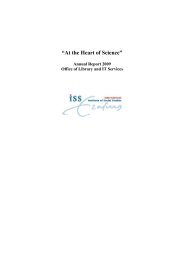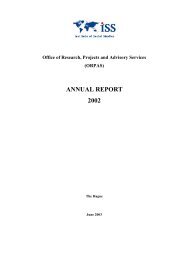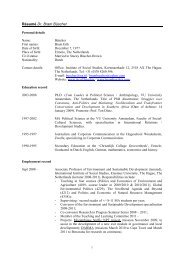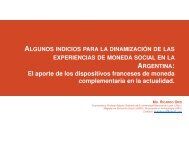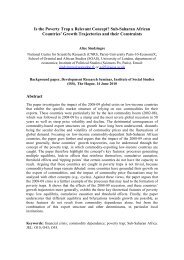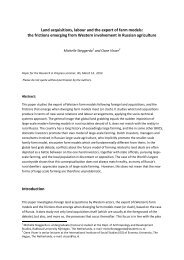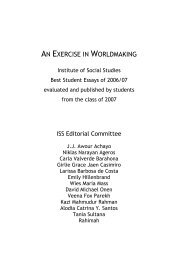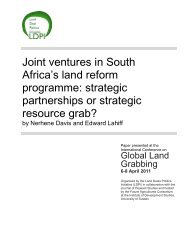AN EXERCISE IN WORLDMAKING 2009 - ISS
AN EXERCISE IN WORLDMAKING 2009 - ISS
AN EXERCISE IN WORLDMAKING 2009 - ISS
You also want an ePaper? Increase the reach of your titles
YUMPU automatically turns print PDFs into web optimized ePapers that Google loves.
178 MEL<strong>AN</strong>IE NEWELL<br />
TR<strong>AN</strong>SFORMATIVE PROGRAMM<strong>IN</strong>G PROMOT<strong>IN</strong>G MALE <strong>IN</strong>VOLVEMENT<br />
The Papai (“daddy” in Portuguese) organization in Recife, NE Brazil is a<br />
research-oriented program started in 1997. It develops activities in gender<br />
and masculinity through partnerships, teaching activities and social<br />
interventions with the local young male population. One of Papai’s projects,<br />
“Gema,” promotes a multi-disciplinary context of dialogue and research,<br />
bringing together researchers in human, social and health sciences<br />
from both universities and NGOs in order to broaden the debate<br />
on SRH. This research group produces books and booklets and organizes<br />
events allowing for a unique sharing environment shaping effective<br />
social interventions and research work in SRH rights. Papai seeks to<br />
open channels of thinking about masculinity that encourage men to reflect<br />
on sexual behavior and the social practices into which they are socialized<br />
yet don’t generally think about. The organization works together<br />
with men to address gender inequalities, and develops strategies to engage<br />
men, placing them at the center of their own discussions and transformations.<br />
One such strategy is “forró” workshops, which use the local<br />
language of music in an effort to attract and sensitize those who hear it<br />
and promote greater participation. In forró workshops popular music is<br />
loaded with lyrics about gender, sexuality and fatherhood, providing content<br />
worth reflecting on. The workshops have so far engaged men in different<br />
contexts including schools, low-income neighborhoods, and<br />
amongst young fathers and RH professionals in the local hospital. Papai<br />
has found that in all contexts, the music brings young men together and<br />
through singing and playing instruments, has created a dynamic environment<br />
for RH education and dialogue. Young men talked about feelings<br />
of insecurity that they didn’t feel able to discuss regularly. The organization<br />
always finds addressing these issues challenging because they<br />
touch on alternative constructs of masculinity, which are not encouraged<br />
by society (Adrião et al. 2002: 204).<br />
Papai also worked with unemployed men who live in extreme poverty<br />
and spend most of their time in bars. Researchers explored ways in<br />
which they could be more self-reliant. The young men said that the<br />
dominant model of masculinity made them feel guilty because their social<br />
and economic status did not allow them to fit the model, causing<br />
them to neglect their bodies and health and expose themselves to dangerous<br />
situations. Forró workshops were used in order to create a comfortable<br />
environment for dialogue about men’s needs.



